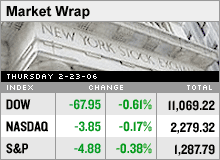|
Dow leads Wall Street retreat
Blue-chip losses weigh on industrials, S&P 500; tech-fueled Nasdaq composite posts smaller loss.
NEW YORK (CNNMoney.com) - Stocks slipped Thursday, with the Dow industrials backing off from 4-1/2 year highs hit yesterday, amid higher bond yields and confusion about when the Fed's rate-hiking campaign will end. The Dow Jones industrial average (down 67.95 to 11,069.22, Charts) lost 0.6 percent, after having ended the previous session at its highest point since June 2001.
The Standard & Poor's 500 (down 4.88 to 1,287.79, Charts) index lost 0.4 percent and the Nasdaq composite (down 3.85 to 2,279.32, Charts) lost 0.2 percent. Treasury prices slipped, raising the corresponding yields and the dollar fell versus other major currencies. Gold and oil prices fell. Stocks were on the defensive from the get go, as interest-rate sensitive investors warily eyed the morning's strong labor market read and the subsequent jump in Treasury bond yields. Such concerns were not allayed by mixed comments from Fed officials throughout the day. In particular, outgoing Philadelphia Fed bank president Santomero reiterated that the central bank is nearly done with its hikes, but also talked about the threat of higher interest rates. Roger Ferguson -- who resigned as vice chairman of the central bank Wednesday -- also spoke. The market improved near midday as the tech sector rebounded. But the advance petered out by the afternoon. For market participants, it's a "foregone conclusion" that the central bank will boost short-term interest rates at the next meeting in March, said Tom Schrader, managing director of listed trading at Legg Mason. "What they're worrying about is the May meeting." The fed funds rate, an overnight bank lending rate, currently stands at 4.5 percent. The central bank has boosted rates by a quarter-percentage point 14 consecutive times since the start of the rate-hiking campaign in June of 2004. "We're starting to get into that no man's land of lack of earnings, with most of the S&P 500 having reported already," said Schrader. "We'll have durable goods orders tomorrow and beyond that, the market is going to have to count on the economic news and the price of oil for drivers." Whether the market can recharge in the short term is unclear. February is a notoriously choppy month on Wall Street, and the major gauges have been hitting up against key technical levels. "It's a hard call to make, but the line of least resistance probably remains up," said James Awad, president at Awad Asset Management. After the close, Gap (Research) reported lower fourth-quarter earnings that met estimates. The clothing retailer also warned that full-year earnings will miss forecasts. Shares fell nearly 6 percent in extended-hours trading. Also after the close, H&R Block (Research) reported lower quarterly earnings that missed estimates. The tax preparation firm also cut its fiscal-year 2006 earnings per share guidance. Shares fell nearly 8 percent in extended-hours trading. What moved?
Of the three major gauges, the Dow struggled the most, with components Merck (down $0.51 to $35.41, Research), General Motors (down $0.60 to $20.59, Research), Hewlett Packard (down $0.57 to $32.37, Research) and IBM (down $1.15 to $80.20, Research) all weighing. Dow stock Intel (up $0.14 to $20.29, Research) gained, but the broader chip sector fell, and that pressured the Nasdaq. The Philadelphia Semiconductor (down 6.30 to 524.48, Charts) index, or the SOX, fell 1.2 percent. Countering that was strength in select tech stocks, including Google (up $12.58 to $378.07, Research) and Apple Computer (up $0.43 to $71.75, Research). Toll Brothers (up $1.05 to $33.54, Research) gained after reporting higher-than-expected quarterly earnings and issuing a mostly upbeat 2006 forecast. However, the homebuilder cautioned that overall housing demand is slowing. Viacom (down $0.94 to $40.96, Research) fell after reporting lower quarterly profit late Wednesday. The media company also issued fiscal 2006 earnings guidance below current estimates. Shares of Sherwin-Williams (down $1.15 to $42.05, Research) and NL Industries (down $0.61 to $12.60, Research) slipped one day after a Rhode Island jury said that the former lead paint makers -- along with Millennium Holdings -- were liable for a product that poisoned children for years. Market breadth was negative. On the New York Stock Exchange, losers topped winners nine to seven on volume of 1.57 billion shares. On the Nasdaq, decliners topped advancers eight to seven on volume of 1.79 billion shares. U.S. light crude oil for April delivery fell 47 cents to settle at $60.54 a barrel on the New York Mercantile Exchange, after the release of the mixed weekly oil inventories report. Investors also took in the weekly jobless claims report, which showed a surprisingly large drop in the number of Americans filing new claims for unemployment last week. Treasury prices slipped, in response to the jobless report and to a weak response to the day's 5-year note auction. The declines pushed up the yield on the 10-year note to 4.55 percent from 4.52 percent late Wednesday. Treasury prices and yields move in opposite directions. In currency trading, the dollar was little changed versus the euro and was weaker versus the yen. COMEX gold for April delivery fell $5.70 to settle at $550.90 an ounce. _______________
Click here for the latest business news. |
|






